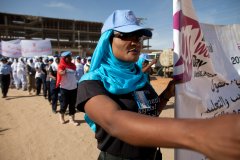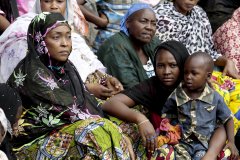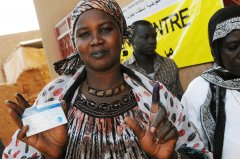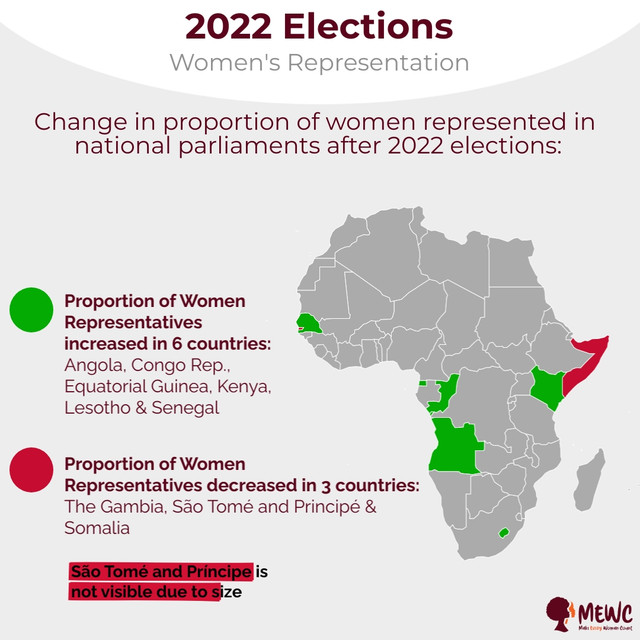Gender Issues Showlist
Women, Peace & Security
UNSCR 1325 calls on all parties to: protect and respect the rights of women and girls in conflict & post-conflict; increase women participation in all conflict resolution, peacekeeping and peace-building & to end impunity by prosecuting perpetrators of sexual and other violence on women and girls
index.php?option=com_content&view=category&id=56&Itemid=1913
Human Rights of Women
Thirty six years after the adoption of CEDAW, many women and girls still do not have equal opportunities to realize rights recognized by law. Women are denied the right to own property or inherit land. They face social exclusion, “honor killings”, FGM, trafficking, restricted mobility, early marriage,...
index.php?option=com_content&view=category&id=44&Itemid=1908
Violence Against Women
Violence against women is the most shameful human rights violation. Gender based violence not only violates human rights, but also hampers productivity, reduces human capital and undermines economic growth. It is estimated that up to 70 per cent of women experience violence in their lifetime
index.php?option=com_content&view=category&id=69&Itemid=1912
Political Participation & Leadership
Where women are fully represented, societies are more peaceful and stable. Women political participation is fundamental for gender equality and their representation in positions of leadership must be a priority for all Africans governments.
index.php?option=com_content&view=category&id=65&Itemid=1911
Latest News
- COTE D'IVOIRE: South-South Meeting to Promote Gender Equality and Combat Deforestation
- RWANDA: Rwanda Set to Launch Cervical Cancer Elimination Plan
- NIGERIA: Over 5,000 Nigerian Women Stranded in Iraq - Govt
- SUDAN: Healthcare Collapse Threatens Pregnant Women in Sudan's Sharg El Nil
- GHANA: President Nominates 12 More Ministers
- Senegal: Parliamentary election 2024
- Mauritius: Parliamentary election 2024
- Ghana: Presidential and Parliamentary Elections
- Botswana: Parliamentary elections 2024
- Algeria: Presidential Election 2024
GAMBIA: She She She - African Women's Decade (2010-2020)
Source: AllAfrica
By Halimatou Ceesay
Did you know that there is a Declaration put together by the African Union on Gender Equality and Women's Empowerment called the "African Women's Decade 2010-2020"?
Well, it has been in existence for four years now and it is all geared towards improving the lives of African women.
Energizing the African women's movement, and mentoring young women leaders and professionals, both in Africa and the Diaspora to be champions on gender equality and women's empowerment; implement the AU parity principle in line with the AU gender policy, and ensure targets for equal opportunities for women in decision-making positions, in the political, legislative, Judiciary and Executive are achieved.
Work with the African Union Peace and Security Department (PSD), the Peace and Security Council (PSC) and the Panel of the Wise in relation to United Nations Security Council Resolutions: 1325, 1820, 1888 and 1889, with particular focus on Violence Against Women (VAW), peace building and reconstruction.
Moving Africa from Commitments to Action
The African Women's Decade was launched in Nairobi, Kenya, in October 2010.
The Decade is an opportunity to integrate and strengthen linkages in the work on women's human rights, integrate women's social, political, economic and cultural rights in a single agenda.
It is also an opportunity to show the multiplier effect that achieving all these rights has for women and society at large.
To the greatest extent possible, the goals of the Decade should be linked to the Millennium Development Goals (MDGs) which are the primary yardstick for progress in Africa.
The ideology behind this is not that women are being left behind by development, but that development on the continent is slowed by the exclusion of women.
As the continent experiences a wave of increased fundamentalism, the Decade can also be used as a critical space to foster dialogue on progressive views on culture, traditions and religion, as a catalyst for accelerated realization of women's rights.
The decade additionally provides an excellent platform for the women's movement to work together and reach out to other constituencies, to tell our stories, celebrate victories and achievements, and project our own images of African women and girls to Africa and the world.
The Ten Themes for the African Women's Decade (2010-2020)
1. Fighting Poverty and Promoting Economic Empowerment for Women and Entrepreneurship
Attain decent work for women and equal opportunity in employment, promotion, and movement towards parity at the work place.
Create employment and services by supporting women entrepreneurs particularly in informal sectors, including small medium enterprise (SME), medium enterprise (ME) and grow them to big businesses.
2. Agriculture and Food Security.
Achieving food security and fighting hunger.
Increase women's access to agricultural land, farm inputs, credit, technology, extension services, irrigation and access to water through water harvesting, boreholes etc.





